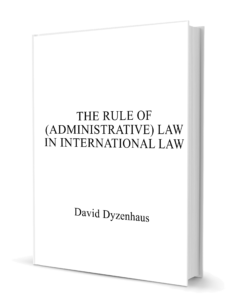
David Dyzenhaus
Read PDFRead PDFIn common-law legal orders, public power is supposed to be exercised in accordance with the rule of law. Administrative law, the law that governs the exercise of power by public officials, is the body of rules and principles developed by judges to ensure that when public officials act, they act in accordance with the rule of law. Severe tensions can arise within the common-law understanding of administrative law when a legislature enacts a law that meets the legal order’s formal criteria for validity, yet purports to exempt officials from the requirements of the rule of law. If those officials’ decisions are challenged before a court, should the court declare them invalid simply on the basis that they fail to accord with the rule of law? Judges who adopt positivistic theories of law will generally answer “no” to this question, while judges of a more natural law bent will tend to answer “yes.” The former will determine a law’s validity based only on the criteria explicitly set out in the positive law of their order, while the latter will think that there is more to the question than positive law—namely, the transcendent moral values of the rule of law.


